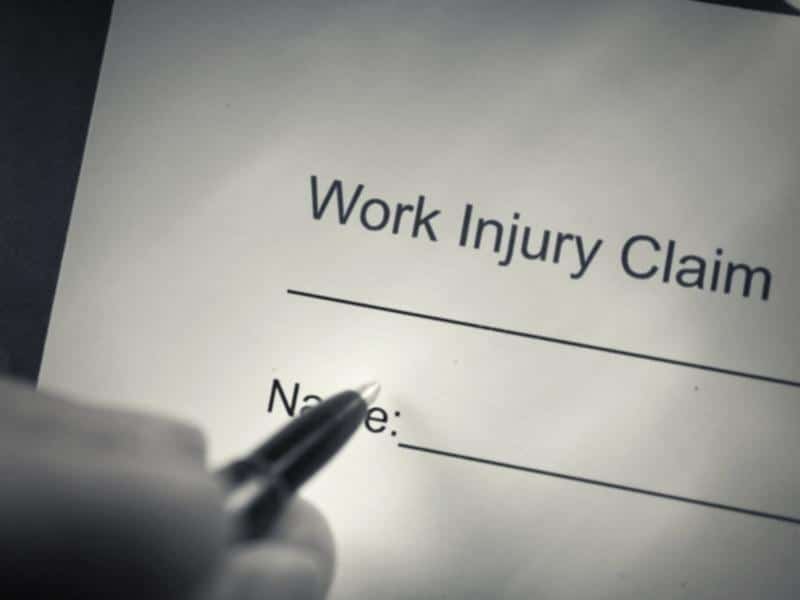Knowing what mistakes to avoid when filing a workers’ comp claim will greatly improve your chances of receiving compensation after you’ve been injured or suffered an illness that causes you to miss time on the job. These workers’ compensation claim mistakes involve reporting, returning to work early, and not following the doctor’s recommendations.
If you’ve suffered an injury or illness due to worksite conditions or accidents, you may be entitled to workers’ compensation benefits. You can obtain these benefits by filing a claim through your employer’s insurer. The workers’ comp system is supposed to be streamlined to ensure injured workers receive the medical care they need after an accident. However, many workers make common mistakes when filing their claims that negatively impact their likelihood of getting approved.
Most Common Mistakes to Avoid When Filing a Workers’ Comp Claim
The 5 most common mistakes that people make with filing workers’ comp are:
- Delayed Reporting
- Accuracy of Injury Reporting
- Ignoring Doctor’s Advice
- Returning to Work Early
- Not Understanding Your Rights
Mistakes like these can have a significant impact on your workers’ compensation claim.
Delayed Reporting
You’ll need to report your injury or illness as soon as it happens, within reason. If you are hospitalized, you may not be able to report within a 24-hour period, for example. If your illness isn’t reported on time, it could be interpreted as something you were exposed to elsewhere.
The goal here is to comply with the state’s reporting guidelines and to ensure that your employer or their insurer doesn’t look for, and find, a reason to deny your claim. Reporting punctually, in writing, is the first step in ensuring that.
Accuracy of Injury Reporting
You’re going to have to provide an accurate account of what happened when filing your claim for workers’ compensation insurance. You’ll also have to provide an account to your doctor. Include all relevant details about the circumstances of the accident, as well as any symptoms you’re dealing with in both cases. You’ll need to be specific and detailed because at this point in the process, you’re likely to be your only advocate.
Some injured workers, even people with no prior injuries or problems at work, may be tempted to either exaggerate their symptoms or fail to report pre-existing conditions for fear of losing their workers’ compensation claims. Don’t let yourself make this mistake. Doctors who are working on workers’ compensation claims will be paying careful attention to all the details you’ve provided and will notice any inconsistencies in your reporting when compared to your test results or their own physical examination or imaging.
Conversely, if you downplay what you’re feeling or experiencing as a result of your injury or illness, the doctor could find that your otherwise legitimate claim doesn’t qualify, and leave you without compensation. Whether you make the mistake of overstating your symptoms, or understating them, you could accidentally cause a denial of your claim and complicate an already difficult process.
Once the process has started, it’s also a good idea to keep a journal of what you’re experiencing and feeling in specific situations or movements so that you can report these accurately to your doctor on subsequent visits.
Ignoring Doctor Advice
Your treating physician will be making recommendations about if or when you can return to work. Once you’re able to return to work, he or she may even have restrictions you’ll have to follow on the job. You’ll need to provide written proof to your employer of the doctor’s advice about your fitness to return, and also about any restrictions or modifications to your work activity that will need to be followed.
Failure to follow your doctor’s advice in these situations could cause you additional pain and discomfort, but could also result in a denial of benefits with the justification that, if you’re not following your doctor’s advice, you must not be as hurt or sick as you say.
Returning to Work Early
Many injured workers feel pressure to return to work earlier than they should, and in some cases earlier than the treating physician recommends. The pressure could be coming from your employer to get back on the job, or it could be internal pressure because you’re concerned about finances and how you’ll be able to pay your bills while you’re out of work.
Regardless of the source of the pressure to return to work, you should avoid returning before your doctor releases you for either full or modified duty. You could find your claim being denied if you return prior to doctor’s approval. If personal finances are the problem, there are some financial solutions while waiting for workers’ compensation that you can consider to help bridge the gap.
Not Understanding Your Rights
Not understanding your rights, according to Nevada law, can be one of the biggest mistakes you can make as an injured worker who is going through the claim process. Many people, for example, believe they must go to whatever doctor their employer chooses for their medical care. In fact, if your request is made within the first 90 days after the injury, you can choose your own doctor to provide care for your injury or illness.
Another example would be someone who had a pre-existing condition that was aggravated or worsened due to an accident at work. Many people don’t believe they will qualify for workers’ compensation claims due to the prior injury, but that isn’t necessarily true.
Hiring an experienced workers’ compensation attorney can prove beneficial to you if you aren’t intimately aware of all the rights you have as a worker in Nevada. Your lawyer will have that knowledge, and will be able to apply it in a way that most benefits you in your claim process. Some choose to hire an attorney only after their claim has been denied, but you could give yourself an advantage by tapping into that knowledge and skill in advance to help ensure the claim is never denied in the first place.
FAQs About Mistakes That Happen When Filing Workers’ Comp Claims
- What happens if I don’t report my workplace injury immediately? Failing to report your injury right away can result in a denied workers’ compensation claim.
- What if I don’t agree with the doctor’s treatment plan? Can I choose my own doctor for workers’ compensation treatment? If you don’t agree with the doctor’s treatment plan, you should get a second opinion. You can generally choose your doctor within an approved network.
- What if I return to work before my doctor approves it? Returning to work too soon can worsen your injury and may lead to a claim denial.
- How can I ensure my injury report is accurate? Be detailed and truthful. Keep a journal of your symptoms to help you remember specifics.
- Should I hire a workers’ compensation lawyer before my claim is denied? Hiring a lawyer early can help you avoid mistakes and increase your chances of success.
When to File for Workers’ Compensation
If your workers’ compensation claim is caused by an accident on the job, you should report the accident immediately and in writing. If you have to be hospitalized due to your injury, you’ll need to make the report as soon as possible after leaving the hospital.
Likely in a case where the injury is severe enough to warrant hospitalization, your employer may start the reporting process for you, but never assume they will do so. You should also remember that a verbal report of the accident without a follow-up report in writing may be considered insufficient.
If you’ve been injured slowly, over time, with repetitive motions or damage, the reporting time may get a little more difficult to determine. You should report the injury, in such a case, as soon as you realize that the injury exists if it was likely caused by work activities. You may also have a claim if you have worsened or complicated a previously diagnosed condition.
If you become ill due to exposure from your workplace, you’ll need to report this in the same manner as an injury as soon as your illness becomes apparent. Delaying reporting in the case of illness may make it more difficult to determine where and when you were exposed.
Ensure that you report punctually, accurately, and on time to help you avoid a denial of workers’ compensation by your employer’s insurer. Never forget that insurance companies are in the business of collecting premiums, not paying claims. You don’t want to make a simple error that allows them to deny you compensation and coverage that you have a right to.
Follow These Steps to Avoid Mistakes When Filing a Workers’ Comp Claim
The first step for filing a workers’ compensation claim is to properly report the injury or illness to your employer. Once that is complete, you’ll receive medical treatment covered by workers’ compensation for your injury or illness. In Nevada, you may choose your workers’ comp doctor as long as the claim is timely.
Once your initial medical treatment has been made, your employer will file a Report of Injury with the insurance carrier. The workers’ comp insurance company will send an info packet to the injured worker and utilize that information, along with any medical reports from your treating physician, to either approve or deny your claim. If the claim is accepted, the worker, employer, and insurer will develop a return to work plan that will be followed, and the claim will be closed.
If your claim is denied, the process can get a bit more complicated and may require the assistance of an experienced workers’ compensation attorney to resolve in your favor. A workers’ comp lawyer could prove to be an invaluable asset in explaining more about the mistakes to avoid when filing a workers’ comp claim, identifying any mistakes you may have already made, and ensuring you get the result you deserve.





